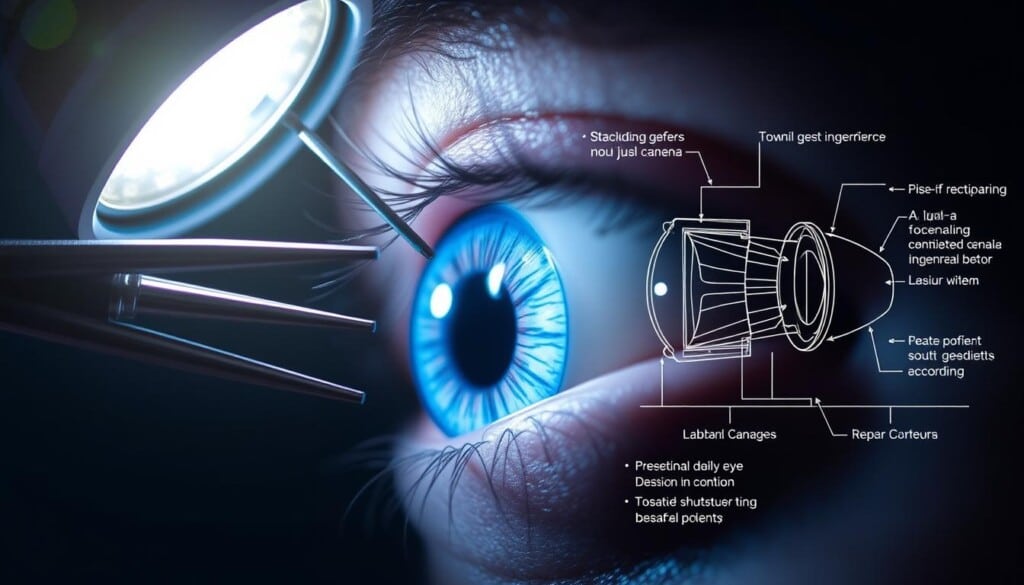Ever thought about ditching glasses and contacts for good? Laser Eye Surgery, like LASIK and PRK, has changed how we fix vision problems. Thanks to new tech, people can see better and live better. This article explores the perks of eye surgery, showing how it boosts your vision and confidence.
Key Takeaways
- Laser Eye Surgery offers significant vision correction without the need for glasses.
- LASIK surgery is one of the most commonly performed refractive surgeries.
- Individuals can experience enhanced quality of life following eye surgery.
- Safety measures and advancements make laser eye procedures reliable.
- Understanding local options is essential; LocalZ can help connect you with providers.
Understanding Laser Eye Surgery
Laser Eye Surgery uses advanced laser technology to fix vision problems. It corrects nearsightedness, farsightedness, and astigmatism. The right surgery depends on your eye health and lifestyle.
What is Laser Eye Surgery?
Laser Eye Surgery reshapes the cornea with lasers. This lets light focus right on the retina. It’s a precise surgery that aims to reduce or eliminate the need for glasses.
It’s popular because it’s safe and works well. Many people choose it for better vision.
Common Types of Laser Eye Surgery
There are two main types: LASIK and PRK surgery. LASIK is known for quick recovery and less pain. PRK is for those with thinner corneas.
Bladeless LASIK is also important. It uses new technology for safer and better results.
How Laser Eye Surgery Works
In Laser Eye Surgery, a laser beam reshapes the cornea. This change lets light focus better on the retina. It’s a key step to clear vision.
Each method has its own way of doing this. But the goal is always to improve how light focuses on the retina.
Benefits of Laser Eye Surgery
Laser Eye Surgery brings more than just better vision. It improves your life quality and saves money in the long run. People no longer rely on glasses or contacts, making everyday activities easier and fun.
Improved Vision Without Glasses
Eye laser treatment can give you sharp vision without glasses. Many people see 20/20 or better after surgery. This freedom makes daily tasks and hobbies more enjoyable.
Not wearing glasses or contacts means no more discomfort or hassle. It’s a big relief from traditional vision correction methods.
Enhanced Quality of Life
Laser Eye Surgery also boosts your lifestyle and confidence. You won’t have to worry about losing or breaking glasses. This makes sports and physical activities stress-free.
Improved vision also lifts your self-esteem. It encourages a more active and fulfilling life, improving your overall well-being.
Long-Term Cost Savings
From a financial standpoint, Laser Eye Surgery is a smart investment. The initial cost may seem high, but it saves money in the long run. The cost of glasses, contacts, and accessories adds up over time.
Choosing eye laser treatment is a wise choice for your vision and wallet. It offers a lasting solution that saves money and improves your life.
Is Laser Eye Surgery Right for You?
Thinking about Laser Eye Surgery? It’s important to look at a few key points. You need to know who’s a good fit, what risks there are, and why talking to a doctor is a must.
Ideal Candidates for the Procedure
People who might get Laser Eye Surgery usually have stable vision and are over 18. They often have problems like nearsightedness, farsightedness, or astigmatism. Doctors check things like how thick your cornea is and the size of your pupils to see if you’re a good candidate.
Risks and Considerations
Laser Eye Surgery has its benefits, but it also comes with risks. You might experience dry eyes, glare, halos, or changes in your vision after the surgery. Because everyone is different, it’s important to talk about these risks and what to expect.
Consultation with a Specialist
Talking to an eye doctor is a big step. They can check your eye health and plan a treatment just for you. This is your chance to ask questions, share your worries, and make sure you’re on the right path.

The Laser Eye Surgery Process
The Laser Eye Surgery process has several key steps for a smooth experience. It begins with a first meeting and a detailed eye check. This check helps see if you’re a good fit for surgery. It also looks at your eye health and tailors the treatment just for you.
Initial Consultation
In the first meeting, experts thoroughly check your vision and eye health. They look for any issues and talk about what you can expect from the surgery. It’s a time to ask questions and share any worries you might have.
Preparation for Surgery
Getting ready for surgery is very important for the best results. Doctors give clear instructions before the surgery. This might include not wearing contact lenses or skipping certain medicines. Following these steps helps you get ready both physically and mentally for the surgery.
Recovery and Aftercare
After the surgery, most people can get back to normal in a day or two. Taking care of your eyes during this time is key. You might need eye drops to prevent infection and reduce swelling. Also, you’ll need to go back for check-ups to make sure everything is healing well. Paying close attention during this time can really help your eyes heal better.
Local Laser Eye Surgery Options
Finding local laser eye surgery options is key to better vision. People should look for qualified eye care providers near them. Using tools like LocalZ can help find providers close by. This makes it easier to find reliable clinics in your area.
Finding Providers in Your Area
Start by searching online directories to find laser eye surgery providers. LocalZ can help find experts in laser eye surgery. It’s important to choose someone close to make visits easier.
Read Reviews and Ratings
Reviews and ratings are very helpful when picking a clinic. Feedback from others can show how happy they were with the service. Reading these can help find a provider that fits your needs.
Comparing Costs and Services
Prices for laser eye surgery vary a lot. It’s smart to compare costs and services from different clinics. This way, you can choose the best option for your money and needs.
Laser Eye Surgery Financing
Understanding how to finance Laser Eye Surgery is key to making smart choices. The costs can vary a lot. They include the surgery itself, tests before it, and care after.
Patients often feel overwhelmed by the range of possible expenses.
Understanding the Costs
The cost of Laser Eye Surgery includes many parts. There are fees for the first meeting with the doctor. Surgeons usually explain all the costs during this meeting.
This helps patients plan better for the surgery.
Payment Plans and Insurance Coverage
Many clinics offer payment plans to help with the cost. This makes the surgery more affordable by allowing payments over time. But, health insurance might not cover it.
It’s important to talk about insurance and payment plans with the clinic.

LocalZ: Connecting You to Laser Eye Surgery Clinics
LocalZ is an online directory that connects you to local laser eye surgery clinics and other important services. It makes it easy to find laser eye surgery clinics near you. This way, you can find the best options in your area.
LocalZ lets you search for clinics based on your specific needs and preferences. This makes finding the right clinic a better experience for patients.
How LocalZ Works for You
Using LocalZ is easy. Just enter your location and get a list of nearby laser eye surgery clinics. Each clinic’s listing has important details like services offered, contact info, and patient reviews.
This organized way helps you make a smart choice. You can pick a clinic that meets your needs.
Benefits of Using LocalZ
Using LocalZ has more benefits than just finding a clinic. By choosing local services, you help your community grow. You also support nearby healthcare providers.
With LocalZ, you get all the details you need. This helps you choose the best laser eye surgery options. It’s good for your health and helps your community too.
Community Impact of Local Businesses
Supporting local businesses, like those in healthcare, has big benefits for communities. When people choose laser eye surgery at nearby clinics, they help their local economy grow. This choice improves their health and strengthens the bond between them and their healthcare providers.
LocalZ is key in connecting people with qualified surgeons and clinics. It highlights the value of investing in the community.
Supporting Local Surgeons
Choosing local surgeons offers two main advantages. Patients get care that fits their needs, and these doctors stay part of the community. This support builds trust and helps understand local healthcare challenges.
By investing in local professionals, communities get access to top-notch medical care. This is very important for laser eye surgery.
Investing in Your Community
Every visit to a local surgeon helps the community’s health and economy. Patients help local businesses grow by choosing them for laser eye surgery. This keeps money in the community, helping small businesses thrive.
By picking nearby clinics, residents help build a strong local healthcare system. This system benefits everyone’s health.
Patient Testimonials
Patient testimonials are key, sharing real stories of those who got laser eye surgery. They show how the surgery has greatly improved their vision and life. It’s amazing how it can change simple things like reading or driving.
Success Stories of Laser Eye Surgery
Many patients talk about how laser eye surgery has improved their lives. It means no more glasses or contacts for some. Others say it gave them sight they never thought they’d have. These stories show how better vision can change a person’s life.
Sharing Your Experience
People who’ve had laser eye surgery often want to help others. They share their stories, creating a supportive community. This helps others learn and make choices about their own laser surgery experience. Joining online groups can be very helpful.

Future of Laser Eye Surgery
Laser eye surgery is getting better, thanks to new tech. Scientists are working hard to make surgery safer and more precise. They aim to make the whole process smoother and more effective.
Advancements in Technology
New tech has brought better lasers and tracking systems. These tools help doctors work more accurately, reducing risks. They also use advanced imaging to give patients the best care possible.
Emerging Techniques
New methods in laser eye surgery could change how we recover and see. These new ways focus on making patients comfortable and quick to heal. They promise to improve both vision and the patient’s experience.
Common Misconceptions
Many people are hesitant about Laser Eye Surgery due to misconceptions. They worry about pain and safety. But, the truth is, most patients feel little discomfort during and after the surgery.
This is because of the high safety standards used. The technology is FDA-approved and has a good success rate. Knowing this can help people make better choices.
Debunking Myths About the Procedure
Some think Laser Eye Surgery is very painful. But, most patients say it feels like a normal medical procedure. Learning the facts can make people feel more positive about it.
Getting the right information is key. It helps people understand what to expect. This can make them more open to the idea.
Understanding Safety Measures
Safety is a top priority in Laser Eye Surgery. The methods used are well-researched and proven. This ensures the surgery is safe and effective.
Knowing about these safety steps can help clear up myths. It lets people feel more confident about trying Laser Eye Surgery.
Conclusion: Embrace Clear Vision Today
Choosing Laser Eye Surgery is a big step towards a better life. It starts with looking into options on LocalZ, a site that helps find local clinics. LocalZ makes it easy to find trusted surgeons and learn about laser surgery.
Supporting local healthcare is very important. It helps the local economy and makes healthcare better. It also builds trust in medical services and strengthens community ties.
Good vision leads to a more confident life. It lets people get involved in their communities more. This makes life more fulfilling and connected.

